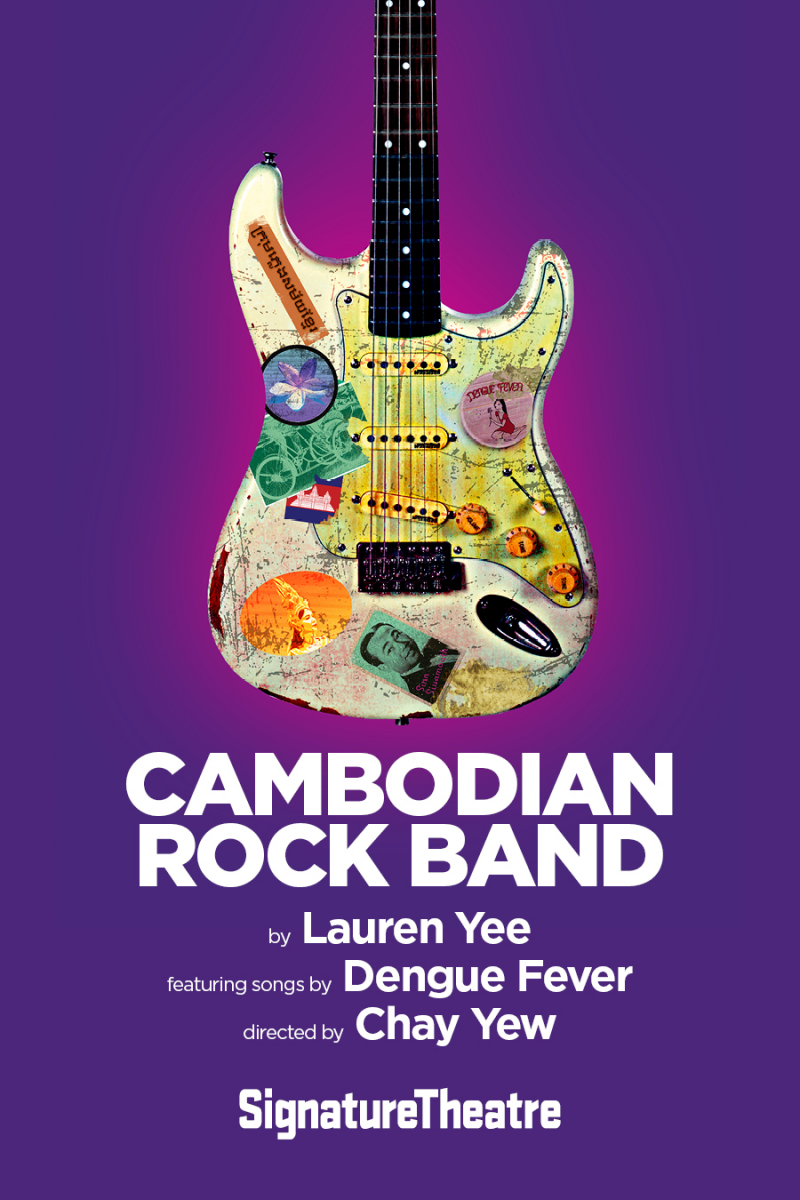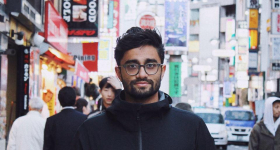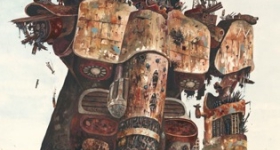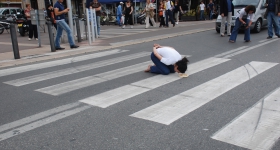On March 11, Lauren Yee’s “Cambodian Rock Band” gave its final performance, closing early due to the increasing health threat of COVID-19. A play about generational trauma, genocide, family and music, the sense of foreboding was an eerie thing to watch amidst the impending chaos unfolding in real life. A week into lockdown, I spoke to Yee on the phone about the genesis of the show, how it can be a singular story that can launch the telling of other stories, how it fits into our current moment and how we can help Asian American theater in the coming months. (Minor spoilers ahead!)
This interview has been edited for clarity and length. You can read my review of the play here.
Karissa Chen
My first question is — so you yourself are not Cambodian?
Lauren Yee
No, I'm not. I'm Chinese American.
KC
So what inspired you to write this work, and how did you go about researching and making sure that you really got the story right?
LY
So I guess one thing to say is that one of my actors, Joe Ngo — who is Chinese Cambodian American, and whose family did go through a lot of this history — at a certain point, with the production at Oregon Shakespeare Festival, [Joe] was just struggling under the weight and the responsibility of what it is to be part of the story and tell it every night. So one thing that our director Chay Yew told him was, "You are not responsible for telling every Cambodian American story here. You are telling one very specific story and trying to do it as skillfully and empathetically as possible, but it's not your responsibility to speak for an entire group of people and an entire wide range of experiences."
Obviously, while my background is different, I think there's some wisdom to be gleaned from that. I came into this story because I fell in love with the music of Dengue Fever. Not knowing what the music meant or the history behind it, I heard them one day at a music festival and was really struck by it. And then when I was able to do more research into the music, where it comes from and what happened to all those artists, it really stuck with me. It haunted me for a very long time. This was back in 2011. For a long time, I thought, I love this music, it should be known by more people.
When I started the play in 2015, it felt like it was finally the time to write it. It was then that I was like, Okay, I know the right way into this. I read a lot of stories about parents and children and family, intergenerational secrets and trauma. And so for me, even though my parents were not immigrants, there are aspects of that story that I can relate to. And I thought, Oh, I know how to tell that story. I know how to find something in there that feels genuine and heartfelt to me. That's where it began.
Because to me, the father-daughter dynamic is me and my father. My father is that slippery and that person who uses cheer and optimism and bright-siding as a way to shield a much more complicated person from view.
"You are telling one very specific story and trying to do it as skillfully and empathetically as possible, but it's not your responsibility to speak for an entire group of people and an entire wide range of experiences."
KC
The thing that really got me about the play was that it was so reflective of what a lot of children of immigrants experience, especially when there's a trauma that is involved. It was actually interesting, because, after I saw the show, I was so excited about it. And the first thing I always do when I'm excited about something is Google to see what other people think. There were a lot of great reviews, but some of the reviewers were not that into that father-daughter relationship. I looked at it and I thought, Oh, these bylines are all by people who are white. They’re not getting it. They are missing this thing that is really speaking to me, as an Asian American, as a daughter of immigrants.
I think in America, white audiences particularly enjoy a certain kind of “trauma porn,” these elevated stories about downtrodden, sad, tragic places. I love that you address that straight on in the opening where the character says, This is what you probably think about Cambodia, like the killing fields. And that's not what this is about. I wanted to know if even though you put that in there explicitly, did you wonder, especially with the intense scenes at the death camp, how the white audiences might react to that or that it might be taken and twisted in a way that was not your intent?
LY
I'm someone who has written about Asian American identity in many pieces. I think it probably figures in about half of my work. So it's something that I'm very deeply invested in, not just exploring Asian American identity, but particularly finding those facets of the Asian American experience that you don't think about, that don't feel so nutritional and educational. I guess when I do think about what you called “trauma porn,” it's that sense of, Oh, I should know about this culture and these people because I need to add it to my Rolodex of subjects I'm well versed in. I'm less interested in that and [instead am] trying to show you more of just really fascinating human beings and situations that happen to intersect with Asian or Asian American identity.
I think it's hard, because I would say — I actually don't know this for certain, but probably 95% of the time, I'm reviewed by a white critic, probably a white male critic. Not always, but very frequently. I think I've probably never been reviewed by an Asian American critic, and it's possible in my career that will never happen. So there's only so much you can do, right?
At the same time, as a writer, one of [the things I think about] is, Who am I writing this for? I believe that everyone should go see the show. Everyone deserves to have that experience. But if there's one person that I need to get this right for — I think about that a lot. The person that this play is written for is a second-generation Cambodian American kid who may have some history with the music. Because there's really an obsessive amount of detail put into how we chose the music, such that if you know the music really well, you understand what all my choices were. I think [it’s also written for] someone who identifies with that parent-child struggle. Because — and this is just from my observations — I feel like a very big point of concern amongst the second-generation Cambodian American folks is that generational gap. That's something they're grappling with and trying to figure out how to how to bridge. As a writer, you do all you can and you try to think about, Who do I want to write this for? Who if nothing else will go, Ah, you got it.
Joe, who plays the father, and I talked about this. He told me, "You know, there are people who feel like the father is too broad, that the father wouldn't make those jokes, that he would be much more serious, but look at my parents. That's my reference point." You do the best you can.
KC
Joe's an amazing actor. He pulls it off.
LY
It's hard to do. It's a tricky tightrope. He and I both understood just how being able to go back and forth between the humor and the pathos is really important for telling the story. There's a version that I think someone could tell — that I would be less good at telling — that is about a traumatized refugee and all we see of him is the trauma. I personally think that's giving the short shrift. I wanted to present a well-rounded human being.
KC
I think that speaks back to that desire for trauma porn. Because there are probably people who want to see that, when the reality is more like what you're saying, which is levity is what enables a lot of people to survive, to be able to be funny and talk around the point as opposed to really dwelling in it.
You said that sometimes you're in the audience and sometimes you're not. Is there a difference in what people are reacting to on those Asian American nights versus when it's much more maybe mixed or predominantly white?
LY
It was like night and day. On the Asian American nights, it's still pretty diverse, but on the whole tended to be much younger. I would also say a lot of people who were in the theater/ entertainment industry were there. And so [there was a] quickness in how they got the jokes and sense of humor. There was a poignant spirit to it.
You know, I think everyone should see this play. I don't care what age you are. I don't care what your background is. But at the same time, these Asian American nights offered up a space for people who wanted to experience the play with people who might have some common backgrounds. I think it really showed. It lets you experience the story and without having to feel hemmed in by concerns like, Am I laughing too loudly? I've heard of incidents during other culturally specific shows where a white audience member says, “Why are you laughing so hard?” Or, “I don't get it, what’s that about?” And they feel they’re owed an explanation. Which I would argue is not the point of theater. [The point] is to be thrown into a [new] world. And even for an Asian American audience, some of the music [is new]. Some of you might know the music, probably a lot of you won't, but you're there to experience and soak up the world and try to make sense of it.
KC
Have you had specific reactions from Cambodian audience members that have said anything in particular?
LY
I think what's really fascinating is what they react to. There are certain things — for instance, the animosity between Cambodians and Thai — that from a general audience, even an Asian American audience, gets a laugh and we move on. But when we've had large groups of Cambodian American audience members, there is a big reaction. There's a laugh, but then there's also a feeling amongst those people like, yeah, that's real, we are not so happy with the Thais.
What we saw too was a lot of the younger generation — people who weren't survivors, people who were born in America — who would see the show and then come back with their parents, who may have been survivors and then tell their stories. They would grab me during intermission or after the show and tell me, “This is what happened to me.” I think it goes back to what Chay was telling Joe, that this is one story. This is one story from one fictional family. Yes, it’s based on many real stories out there. But this is one story. And I think seeing the play as a gateway to start that conversation for many other stories is incredibly satisfying.
KC
I know I told you this, but I was there on the last night. Even at that point in time, we were nervous already, so there was looming dread in the back of my mind as I watched the show. And with the way that the first act ends, with this feeling that everything is about to change. … Even though it’s a completely different scenario, at that point in time it landed really heavily in my gut. I'm wondering, to have this particular show close early in these circumstances, did your own work end up speaking to you in a way that you hadn’t foreseen?
LY
Oh totally. If you look at what people in general during the Civil War were thinking, they were not thinking that the Khmer Rouge are going to take over and we're going to run into genocide. They were thinking, well, there's probably going to be some reeducation. Their expectations about what was going to happen were much more measured. And it was a real question for a lot of people, should we get out? At that time, some people saw the writing on the wall and flew out to Paris, they sold everything, while some people thought, I think we're going to be okay, let's just try to ride it out here. There were there lots of different versions about what this was going to mean.
KC
The show is obviously really heavy. But it's balanced out with a lot of levity. And music is such a big part of it. It's amazing music. There's a sense throughout the show that music and art is still really meaningful and important in the midst of horrifying conditions. And that it actually helps us to survive. Given the state of things now, where we have some actors out of work and it’s so much harder for artists, do you feel like that message resonates even more now?
I was interested in what happens if you [tell the story of the people] whose survival we hear less about.
LY
Art is resilient. Art is the only thing that will be left of us afterwards. So I think even though everyone will be trying to figure out the new state of things and how we do things now, there is always a place for storytelling and creation. That won't go away. I think we're all waiting to see what it is like to gather in large groups and in public spaces for the near future, and everyone has absolutely no idea. But art will always be there.
KC
I really love that turn in the last third of the show where we are reeled into believing that Duch is the one who's controlling the narrative, but it's pulled away from him. Why did it feel so important for you to give Duch such a strong presence as an active member in the story, and then give him that turn?
LY
So a little background on Duch. He's obviously a real person and he was the first one charged with crimes against humanity in the extraordinary chambers. He was the first one charged because he gave an interview in 1999 when they were asked, Are you Duch? And he said yes and told them the whole story. So for a very long time, Duch [in real life] has been able to control the narrative because he was the one willing to speak, which does not make him less culpable than anyone else. But it has given him a platform with which to be seen by the public and to represent what happens. It's fascinating because when you listen to the interviews that he gives, it's by turns repentant and kind of meek; he's proud and charismatic. You see a lot of facets of this human being. So what I wanted to do was give the audience that same experience. If you were to study this, who do you hear from most? You hear from the perpetrators and you hear from the perpetrators that talk the most, which is Duch. There’s something charismatic in these people. I was interested in what happens if you present that and then turn it to be about the so-called more ordinary people who also populate the story and whose survival we hear less about.
KC
Was it hard to find Asian American actors who could also convincingly be members of a rock band?
LY
It's not hard. In a way, the show exists as it does because I cast a bunch of actors who played instruments already. Joe was great for it acting-wise, and then he told me, I play electric guitar. So I said, Oh, well, let's try having you play in the show. There's just a wide, deep pool of talent that normally doesn't get taken advantage of. A lot of these actors that I cast were actors first and had never been asked to play music. It seems so basic, but Asian American actors are really excited when they realize, Oh, it's a role where I get to be funny or I get to sing, or I get to do multiple characters.
KC
You're finally using them to their full potential.
LY
Yeah. But it's something that many other actors get asked to do all the time.
KC
How did you approach Dengue Fever for the rights to incorporate the music? Did you tell them what you were planning or had you already written it?
LY
I began writing the play with some research just about Orange County, because that was how it was commissioned. And I reached out to them and met them, and said, Well, I don't know what I want to do yet, but I'll keep you posted. Then as I was discovering that live music performance had a place in the show, I was talking to their manager, Josh Mills, and he was just incredibly supportive and kind and really helped pave that way for making it happen. They were incredibly generous as collaborators. And just so you know, half the music is Dengue Fever, half of it is real Cambodian oldies.
KC
That's so amazing. I mean, the music brings so much to the show. And I hadn't heard most of it.
LY
It's the best music and no one's ever heard.
KC
It’s perfect, atmospherically. It brings so much to the show. Is it at the beginning of Act Two, or maybe right after they are taken over in Act One, when they're rocking out so hard? It was so great but also hard to listen to because of the context in which you placed it.
LY
I think that's what the music is in the show. It is both a painful reminder of what was lost and also a balm. Especially the scene at the very end when Chum and his daughter are up there with the band. The truth is most of those people are dead and he's doing this impossible thing of playing with a band of ghosts.
We're potentially looking at a whole lost generation of really talented artists, who were beginning to come into their own, if we don't support them.
KC
How do you think that the landscape of Asian American theaters is changing in general?
LY
I mean, up until very recently … February was a good month to be an Asian American. Between Parasite, and in New York, you had maybe about, depending on how you counted, five to seven [Asian American] shows that were either in production or in rehearsals, which, if you asked anyone who's been in the scene even longer than me would say, that's crazy. And especially having been done at theaters whose mandate was not Asian American work.
Now, the level of anti-Asian vitriol in America and I'm sure many other places in the world is shocking but a little unsurprising.
KC
I hope that when this is all over, Asian American artists will still have a place.
LY
I think that's going to depend on kind of leadership from people like me who are a little more established, saying, “Hey, you know, we need to speak up about this.” Also people like you, the journalists and the arts thinkers who have a platform out there. And organizations like Hyphen.
KC
Are there any emerging Asian American talent in terms of writers or works that are in production that you are excited about?
LY
That's a good question because I don't know what we're going to come out of this with, whose plays are still coming out. I mean, I would say everyone who was playing in New York when we closed are super exciting and so different. Chris Chen had “Headlands,” Celine Song had “Endlings,” Haruna Lee had “Suicide Forest,” Hansol Jung had “Wolf Play,” Qui Nguyen had “Poor Yella Rednecks.” It was a great crop of new voices that are very different, stylistically and subject matter-wise. So it really is stripping away the idea of some sort of monolith.
KC
Is there anything that you want to share that I can't cover?
LY
I guess I would say, once we're all allowed to gather safely again, or even while we're consuming stories online, I’d ask for people to think about those Asian American creators, to support those stories to get them back on their feet, to support artists in whatever way they can. Because I think it's going to be a very difficult field ahead for a lot of freelancers. We're potentially looking at a whole lost generation of really talented artists, who were beginning to come into their own, if we don't support them.
KC
Are there any resources or places that people can donate to support our theater folks?
LY
There's a lot of individual GoFundMes and other fundraisers that that are geared towards artists who are hurting. There are a lot of great Asian American theaters that could use your support: East West Players, Ma-Yi Theater, NAATCO, Pan Asian, Theater Mu. Because it's not the biggest organizations that won't survive. It's the mid-size and smaller ones, where losing a production or losing a gala is going to make a huge difference.
It has recently been announced that there will be a North American tour of the play in the 2021-2022 season. The cast album is available on Spotify and the book is available from Samuel French.










Comments